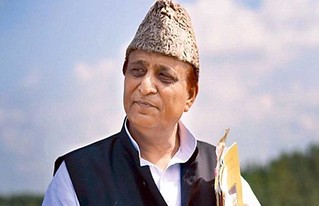Introduction
Azam Khan is a prominent Indian politician known for his long-standing involvement in Uttar Pradesh’s political landscape. With a career spanning several decades, Khan has established himself as a significant figure in Indian politics. His tenure as a Member of Parliament (MP) and a member of the Uttar Pradesh Legislative Assembly (MLA) has been marked by both notable achievements and controversies. This article delves into Khan’s political journey, key contributions, and the controversies that have surrounded him.
Early Life and Education
Azam Khan was born on August 14, 1948, in Rampur, Uttar Pradesh. He completed his early education in Rampur before moving on to higher studies. Khan pursued his undergraduate degree from Aligarh Muslim University (AMU), one of India’s premier institutions. His education laid a solid foundation for his future political career, equipping him with the knowledge and skills required to navigate the complexities of Indian politics.
Political Career
Entry into Politics
Azam Khan’s political career began in the early 1970s. He joined the Indian National Congress party but soon shifted allegiance to the Samajwadi Party (SP), where he found his political footing. His early involvement in politics was characterized by grassroots activism and a focus on social justice issues, which helped him build a strong support base in Uttar Pradesh.
Legislative Achievements
Khan’s political career is marked by several significant achievements. He first won a seat in the Uttar Pradesh Legislative Assembly in 1980. Over the years, he has been re-elected multiple times, representing various constituencies. His work in the Assembly has focused on improving infrastructure, education, and healthcare in his constituency.
Khan served as the Minister for Urban Development and the Minister for Basic Education in Uttar Pradesh. His tenure in these roles saw various initiatives aimed at urban development and educational reform. Under his leadership, several schools were established, and efforts were made to improve basic amenities in urban areas.
National Politics
In addition to his state-level roles, Azam Khan has also made his mark on the national stage. He was elected as a Member of Parliament (MP) from Rampur constituency in the 2009 and 2014 general elections. His tenure in the Lok Sabha was characterized by a focus on issues pertinent to his constituency and the broader socio-economic challenges facing Uttar Pradesh.
Contributions to Society
Educational Initiatives
One of Khan’s notable contributions has been in the field of education. He played a crucial role in establishing the Maulana Mohammad Ali Jauhar University in Rampur. The university aims to provide quality education and promote research in various fields, particularly for the marginalized communities in Uttar Pradesh.
Social Justice and Empowerment
Khan has been a vocal advocate for social justice and the empowerment of marginalized communities. His work has often focused on addressing the needs of minorities, women, and economically disadvantaged groups. His efforts to promote social equity have earned him respect among his supporters.
Controversies and Challenges
Allegations of Corruption
Azam Khan’s political career has not been without controversies. He has faced allegations of corruption and misuse of power on several occasions. Critics have accused him of being involved in financial irregularities and mismanagement of public funds. These allegations have led to legal battles and have tarnished his public image.
Communal Tensions
Khan has also been embroiled in controversies related to communal tensions. His outspoken remarks on sensitive issues have sometimes been criticized for exacerbating communal discord. These controversies have sparked debates about his role in fostering communal harmony in a diverse state like Uttar Pradesh.
Legal Issues
Over the years, Khan has faced numerous legal challenges, including cases related to land encroachments and other legal disputes. These legal battles have added to the complexities of his political career and have been a point of contention among his critics.
Legacy and Impact
Political Legacy
Azam Khan’s political legacy is a complex one, marked by both achievements and controversies. His contributions to education and social justice have had a significant impact on his constituency and beyond. However, the controversies surrounding him have also shaped the public perception of his legacy.
Future Prospects
As of now, Khan continues to be an influential figure in Uttar Pradesh politics. His future prospects in the political arena will likely depend on how he navigates the ongoing legal and political challenges. Despite the controversies, his role in shaping regional politics cannot be overlooked.
Conclusion
Azam Khan remains a formidable figure in Indian politics with a career that spans several decades. His contributions to education, social justice, and infrastructure development have made a mark, while his controversies have sparked debates about his role in Indian politics. As he continues to navigate his political career, his legacy will be defined by both his achievements and the challenges he has faced.
FAQ
Q1: Who is Azam Khan?
A1: Azam Khan is a veteran Indian politician from Uttar Pradesh. He has served as a Member of Parliament (MP) and a Member of the Uttar Pradesh Legislative Assembly (MLA). He is associated with the Samajwadi Party (SP) and has held various ministerial positions in Uttar Pradesh.
Q2: What are Azam Khan’s major achievements?
A2: Azam Khan’s major achievements include his contributions to education through the establishment of Maulana Mohammad Ali Jauhar University, his work in urban development and basic education while serving as a minister, and his advocacy for social justice and empowerment of marginalized communities.
Q3: What controversies has Azam Khan been involved in?
A3: Azam Khan has been involved in several controversies, including allegations of corruption, legal disputes related to land encroachments, and remarks that have been criticized for exacerbating communal tensions.
Q4: How has Azam Khan contributed to education?
A4: Azam Khan has made significant contributions to education by establishing Maulana Mohammad Ali Jauhar University in Rampur, which aims to provide quality education and promote research, particularly for marginalized communities.
Q5: What challenges has Azam Khan faced in his political career?
A5: Azam Khan has faced challenges including legal battles related to corruption and land disputes, controversies over communal remarks, and public criticism. These challenges have impacted his political career and public image.
Q6: What is the future outlook for Azam Khan in politics?
A6: The future outlook for Azam Khan in politics depends on how he addresses ongoing legal and political challenges. Despite controversies, his influence in Uttar Pradesh politics remains significant, and his future prospects will be shaped by his ability to navigate these issues.










